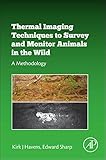Thermal imaging techniques to survey and monitor animals in the wild : a methodology / Kirk J. Havens, Edward J. Sharp.
Publisher: Amsterdam : Academic Press, [2016]Copyright date: ò016Description: 1 online resource (xxi, 354 pages) : illustrationsContent type:- text
- computer
- online resource
- 9780128033852
- 0128033851
- 333.95/416 23
- QL83.17 .H38 2016eb
Includes bibliographical references (pages 321-340) and index.
Chapter 1 -- Introduction; Chapter 2 -- Background; Overview and basic concepts; Counting methods; Direct Counting Methods; Complete Counts; Incomplete Counts; Indirect Counting Methods; Chapter 3 -- Remote Sensing; Introduction; Enhanced visual; Image intensifiers (I2 devices); Low light level cameras; Trip cameras; Radars and sonars; Thermal imaging; Radiotelemetry; Image intensifiers or thermal imagers?; Chapter 4 -- Heat Transfer Mechanisms; Background; Conduction; Convection; Radiation
Phase ChangesEvaporation/Condensation; Animals; Conduction; Convection; Radiation; Phase Changes; Chapter 5 -- Optical Radiation; Kirchhoff's law; Stefan-Boltzmann law; Planck radiation law; Background temperature; Apparent temperature; Apparent Temperature of the Object; Apparent Temperature of the Background; Apparent Temperature Difference, TA; Chapter 6 -- Emissivity; Quality of the surface; Viewing angle; Shape of the object; Apparent temperature Versus viewing angle; Chapter 7 -- Thermal Imagers and System Considerations; Brief history (basic concepts); Thermal Image
Performance parametersSpectral Response; Signal-to-Noise Ratio; Thermal Sensitivity; Spatial Resolution; Detector-Limited Resolution; Optics-Limited Resolution; Range; Thermal Resolution; Chapter 8 -- Imager Selection; Introduction; Thermal detectors versus photon detectors; Thermal Detectors; Microbolometers; Photon Detectors; Selecting an IR imager; Application Requirements; Wavelength Selection; MWIR and LWIR (Experimental Comparisons); Camera features; Verifying performance; Typical MWIR camera; Accessories; Chapter 9 -- Properties of Thermal Signatures; Introduction; Image quality
Signature SaturationSpectral domain; Spatial domain; Size; Shape; Intensity; Viewing Angles; Grouping; Temporal domain; Motion; Habitat; Visibility bias; Surveillance; Discrimination Levels; Surveillance Application; Chapter 10 -- Thermal Imaging Applications and Experiments; Background; Literature reviews; Mammals; Introduction; Mammalian Reviews; Avian Species (Birds); Introduction; Reviews (Avian Species Surveys); Bats; Introduction; Reviews (Bat Surveys and Observations); Nests (Dens, Tree Cavities, Lairs, Burrows); Introduction; Examples of Nest Imagery
Reviews (Nests, Dens, Tree Cavities, Lairs, and Burrows)Invertebrates (Arthropoda); Introduction; Reviews (Invertebrate Observations); Concluding remarks; Chapter 11 -- Using Thermal Imagers for Animal Ecology; Introduction; Methodology; Imager Specifications and Use; Training; Surveys; Introduction (Factors Influencing the Detectivity); Angular dependencies and effects; Size and Shape of Individual Thermal Signatures; Spatial Extent of the Survey Area; Survey Geometry; Air-to-Ground; Ground-to-Air; Air-to-Air; Ground-to-Ground; Signature Dependence on Viewing Angles; Tree Cavity Analysis
Description based on print version record.
Elsevier ScienceDirect All Books
There are no comments on this title.

